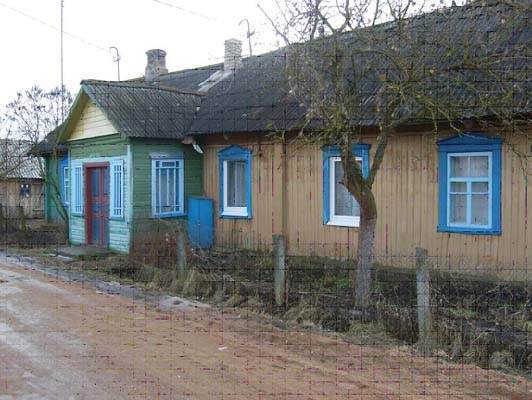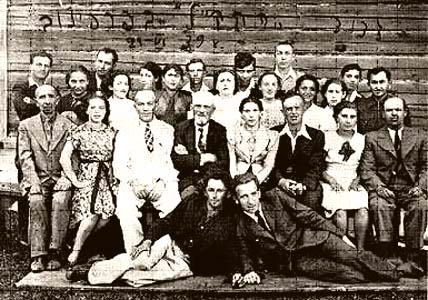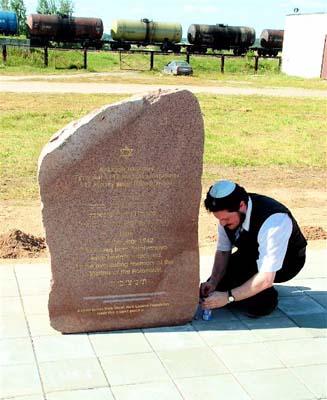

Project «Voices of Jewish settlements. Vitebsk region.»פיתוח קשרי התרבות בין העמים של ישראל ובלרוס
|
|---|
Website search |
|
MainNew publicationsContactsSite mapVitebsk regionMogilev regionMinsk region |
THE TRAGEDY IN PARAFIANOVO Location of former ghetto.
Location of former ghetto.
Before the war Parafianovo was not a poor town. Most of its population was Jewish. Galina Yanukovich, a resident of Parafianovo, recalls: “There were a lot of Jewish children at our school. The religious classes were taught by a catholic and an orthodox priests and a rabbi.” The story of the ghetto in Parafianovo is described in a book written by an Israeli psychologist Bar-On “The silent heritage”. The book contains the memories of the children of those who participated in the Holocaust from the German side. Below is an extract from a conversation with Rudolf, a son of a former German soldier, who was in Parafianovo during the war. Rudolf: I was born on March 4th 1930 in Germany. At that time my father was unemployed. Bar-On: Are you the only son? Rudolf: I was the only son before my brother was born on January 14th 1941. We lived in a small house, built by our father. He was a religious man. At home we used to study the Bible and sing religious songs together. There were also neighbors and friends that came to our house to read the Bible together with us. Later father found a job – he was sent to work in Poland and Russia as a railway worker. He ended up in Parafianovo. He was responsible for a railroad between Parafianovo and Smolensk. After the war he told me about what was happening in Parafianovo during the war. Parafianovo had a Jewish ghetto. The Jews were also made to work at the railroad fixing the damaged parts. Among them I remember father mentioned Aron Kaz, Maria and Dora, a cook. My father was allowed to visit the ghetto and talk to the Jews. Since he was a devoted Christian, he talked to them about the Bible. They all realized they believed in one god and talked freely about it. Then there was a day when the ghetto was surrounded by the German troops. The military men asked my father: “How many workers do you need?” So he replied: “I need them all”. “No, we need many people – they will be shot.” – said the officer. Father just stood there and could not do anything. What could he say? “Then kill me as well”? He had a wife and children to take care of. He was not brave enough. He could not resist. He was not capable of saving the Jews. First a woman was killed. She had given birth the day before that. She was thrown into the grave. They also killed the baby. My father was crying. One young German soldier said: “I cannot go on like this! I have killed so many people. I cannot stand it anymore.” This is the letter my father wrote after the war. The title is: OUR FAULT. The letter is dated May 16th 1945. OUR FAULT Group of Jews in Parafianovo (July 1st 1939).
Group of Jews in Parafianovo (July 1st 1939).
After several weeks of feeling seriously sick I have found the strength to write about the things that have made me so sick and completely destroyed my nerves. Before 1941 I was a principal of a religious school for children. We also had our missionaries in China. Later I joined the party but was promised that I would still be able to work at my school. However, as soon as I became the party member, I was prohibited to work at school. That was the first shock. But I had to be silent.  Opening of Parafianovo memorial.
Opening of Parafianovo memorial.
I was sent to Parafianovo on February 9th 1942. There were 247 Jews living in the town. They had to live in a closed ghetto and work for the Germans. A Jewish girl, Dora, was appointed to cook for us, four Germans. My soldiers did not respect her only because she was Jewish. Soon she noticed that I treated her very well and we became friends, even though no one noticed that. Once I fell ill with flu and Dora called a Jewish doctor to treat me. When I recovered I first visited the ghetto. Normally it would not be allowed by due to my illness I was given permission to visit the pharmacy in the ghetto. Thus I met wonderful people: Maria (the doctor’s daughter), Rita (a teacher), Lilia (a music teacher) and Aaron’s family. These people related me about their troubles in the ghetto. They were given 300 grams of bread per week. I tried to help them as much as I could. I was also very happy when one of our soldiers joined me and started helping the ghetto prisoners. We had to do it very carefully, therefore we visited the ghetto only late in the evening. Then I started hearing rumors that ghettos were being liquidated. Each time they asked me: “What will happen to us?” I tried to explain to them that God will always be with them. This tragedy brought us very close to one another. One evening I visited them again and we sat there singing a song. It had such words: “Tomorrow, if God wishes to wake you up again…” On hearing these words Rita began crying. It was the last night of her young life… In the morning I heard the ghetto had been surrounded by the German soldiers. The Jews were then assembled and made to take off their coats and shoes. Everyone was crying. A 14-year-old boy tried to escape but was shot. The people were forced to dig out a huge ditch and then lie on the ground with their faces down. I dashed to my room. I heard the shooting and fell onto my bed. It took me 28 years to try and find God and now this was happening. Until the last moment I believed that God would save those people. I prayed. But then I cursed the God and all the people. I just wanted to forget everything. Left by God and the people, I just performed my duties, feeling completely indifferent about what would happen to me in future. I could not continue working because I was constantly sick. I was sent back to Germany where I felt even worse – I could not talk to anyone about what had happened. I soon had to go to hospital for examination. Here I told everything to doctor L, who was not a party member. He advised me to try and forget everything. On April 14th 1945 a man approached me in the street. He said: “I know who you are. You undermine the work of the party. It will cost you your life!” I made a few steps and fell onto the ground. The next thing I remember I saw doctor L. and doctor Z. near my bed. I asked myself: “What have I done?!” After the interview we went for a walk and Rudolf said his children did not want him to give this interview. They really wanted to leave the past behind.” Olga Adamovich,
|
|||
|
|
Jewish settlements in Vitebsk regionVitebsk • Albrehtovo • Babinovichi • Baran • Bayevo • Begoml • Beshenkovichi • Bocheikovo • Bogushevsk • Borkovichi • Braslav • Bychiha • Chashniki • Disna • Dobromysli • Dokshitsy • Druya • Dubrovno • Glubokoye • Gorodok • Kamen • Kohanovo • Kolyshki • Kopys • Krasnopolie • Kublichi • Lepel • Liady • Liozno • Lukoml • Luzhki • Lyntupy • Miory • Obol • Oboltsy • Orsha • Osintorf • Ostrovno • Parafianovo • Plissa • Polotsk • Prozorki • Senno • Sharkovshina • Shumilino • Sirotino • Slaveni• Smolyany • Surazh • Tolochin • Ulla • Verhnedvinsk • Vidzy • Volyntsy • Yanovichi • Yezerishe • Zhary • Ziabki • |
Main |
New publications |
Contacts |
Site map |
Vitebsk region |
Mogilev region |
Minsk region |